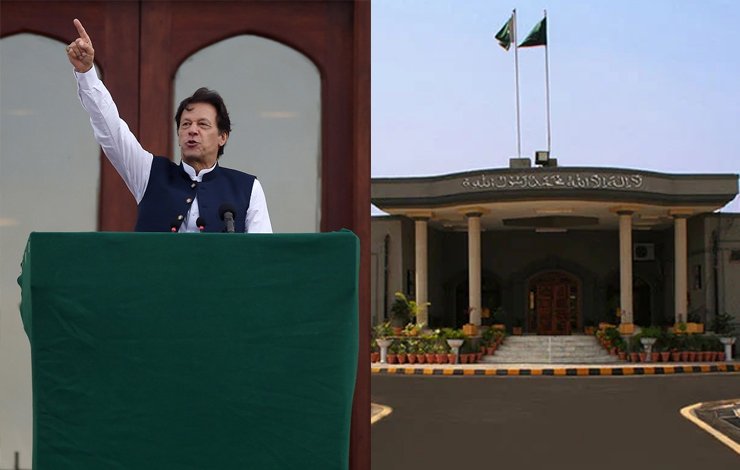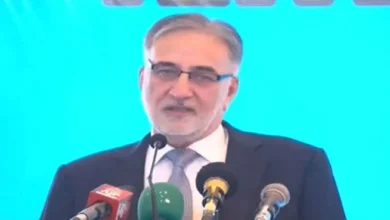Cipher case: Imran Khan’s pleas seeking bail, cancellation of FIR rejected

The Islamabad High Court (IHC) on Friday rejected pleas of former prime minister Imran Khan seeking bail and cancellation of the first information report (FIR) in the cipher case.
IHC Chief Justice Aamer Farooq announced the court order today which was reserved on October 16 after arguments were completed from both sides.
During the last hearing, Khan’s counsel, Sardar Latif Khosa, had contended that a FIR could not be registered against his client since the federal cabinet of the former prime minister declassified the cipher.
He further stated that the ex-premier enjoyed immunity as provided in Article 248 of the Constitution that protects the president, governor, prime minister, federal minister, minister of state, chief minister and provincial minister for their “act done or purported to be done.”
During the hearing, another counsel for Pakistan Tehreek-s-Insaf (PTI) chairman, Barrister Salman Safdar argued that Section 5 of the Official Secrets Act was not applicable in the cipher case.
He said that the section could be invoked for sharing sensitive information with foreigners, and this “main ingredient is missing” in the FIR against the PTI chief.
Imran Khan had challenged the registration of the FIR and sought bail in the case filed against him and the party’s vice chairman Shah Mahmood Qureshi for misusing the secret document for their political gains.
A special court formed under the Official Secrets Act has indicted both party leaders. They are currently incarcerated at the Adiala jail.
On October 26, the IHC had also rejected Imran Khan’s pleas to stop trial in the matter.
FIA charge sheet
The Federal Investigation Agency (FIA), in its challan, stated that the former prime minister and the ex-foreign minister were found guilty in the matter and requested the court to conduct their trial and sentence them in the case.
Former PTI secretary-general Asad Umar’s name was not added to the list of accused while Imran Khan’s former principal secretary Azam Khan was also named as a “strong witness” in the case.
The FIA also attached Azam’s statements, recorded under Sections 161 and 164, along with the challan, said the sources, adding that the PTI chief kept the cipher to himself and misused the state secret.
The sources also said that Khan had a copy of the cipher but he did not return it.
Moreover, the FIA also attached the transcript of Khan and Qureshi’s speech on March 27 — the day when the former premier brandished a letter claiming it was a cipher from a foreign nation, that wanted his government to be removed from power.
The agency also submitted a list of 28 witnesses to the court with the challan after recording their statements under Section 161.
The names of former foreign secretaries Asad Majeed, Sohail Mehmood and the then additional foreign secretary Faisal Niaz Tirmizi have also been added to the list of witnesses.
What is ciphergate?
The controversy first emerged on March 27, 2022, when Khan — less than a month before his ouster in April 2022 — while addressing a public rally waved a letter before the crowd, claiming that it was a cipher from a foreign nation that had conspired with his political rivals to have PTI government overthrown.
He did not reveal the contents of the letter nor did he mention the name of the nation it came from. But a few days later, he accused the United States of conspiring against him and alleged that Assistant Secretary of State for South and Central Asia Affairs Donald Lu had sought his removal.
The cipher was about former Pakistan ambassador to the US Majeed’s meeting with Lu.
The former prime minister, claiming that he was reading contents from the cipher, said that “all will be forgiven for Pakistan if Imran Khan is removed from power”.
Then on March 31, the National Security Committee (NSC) took up the matter and decided to issue a “strong demarche” to the US for its “blatant interference in the internal affairs of Pakistan”.
Later, after his removal, then-prime minister Shehbaz Sharif convened a meeting of the NSC, which came to the conclusion that it had found no evidence of a foreign conspiracy in the cable.
In the two audio leaks that took the internet by storm and shocked the public, the former prime minister, Asad Umar, and Azam Khan could allegedly be heard discussing the US cipher and how to use it to their advantage.
On September 30, the federal cabinet took notice of the matter and constituted a committee to probe the contents of the audio leaks.
In October, the cabinet gave the green signal to initiate action against the former prime minister and handed over the case to the FIA.
Once FIA was given the task to probe the matter, it summoned Khan, Umar, and other leaders of the party, but the PTI chief challenged the summons and secured a stay order from the court.
The Lahore High Court (LHC), in July this year, recalled the stay order against the call-up notice to Khan by the FIA.
The charge sheet added that Qureshi “aided and abetted” Imran and, therefore, was liable for the act in the same manner.
However, both the accused pleaded not guilty.



